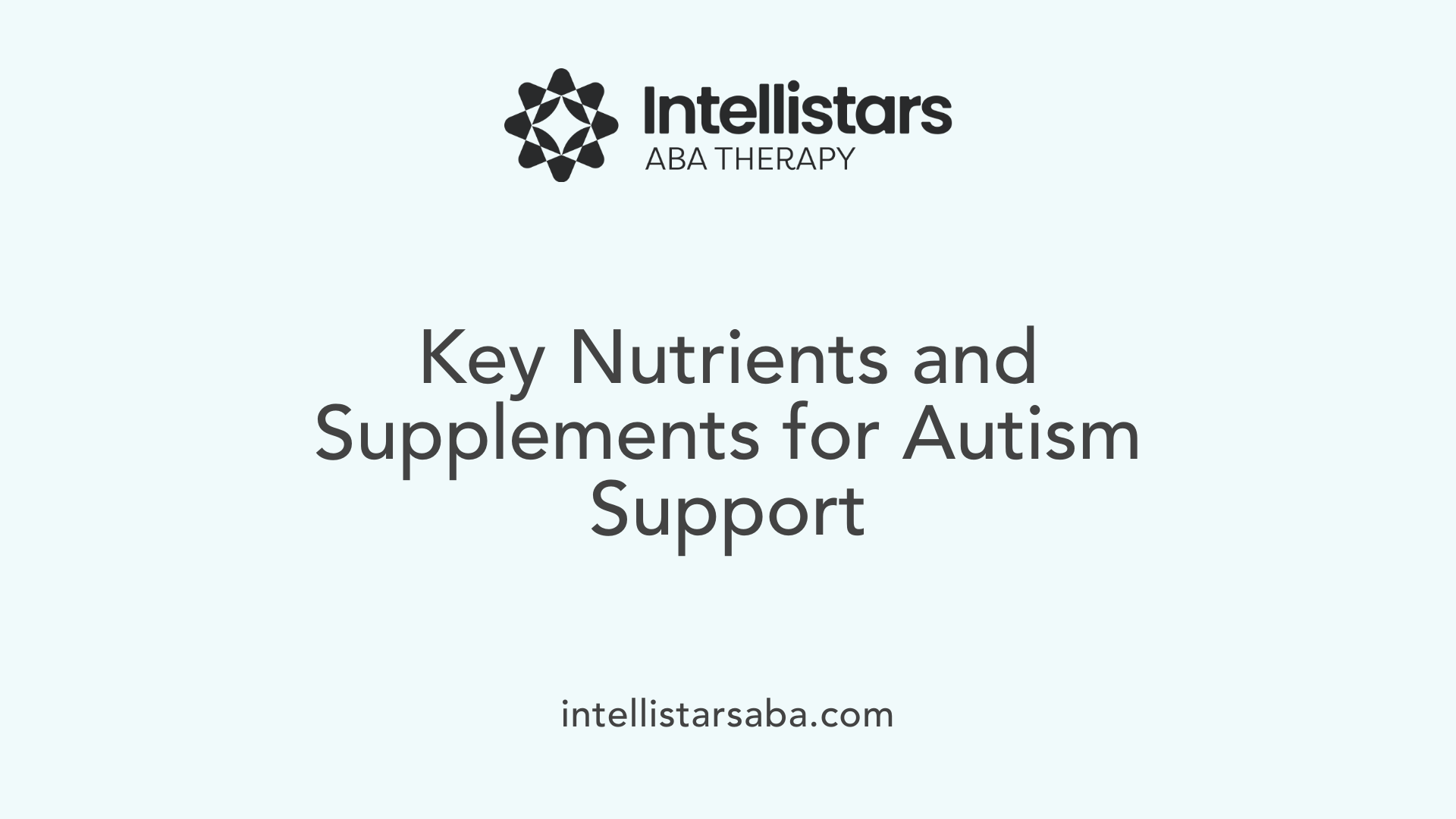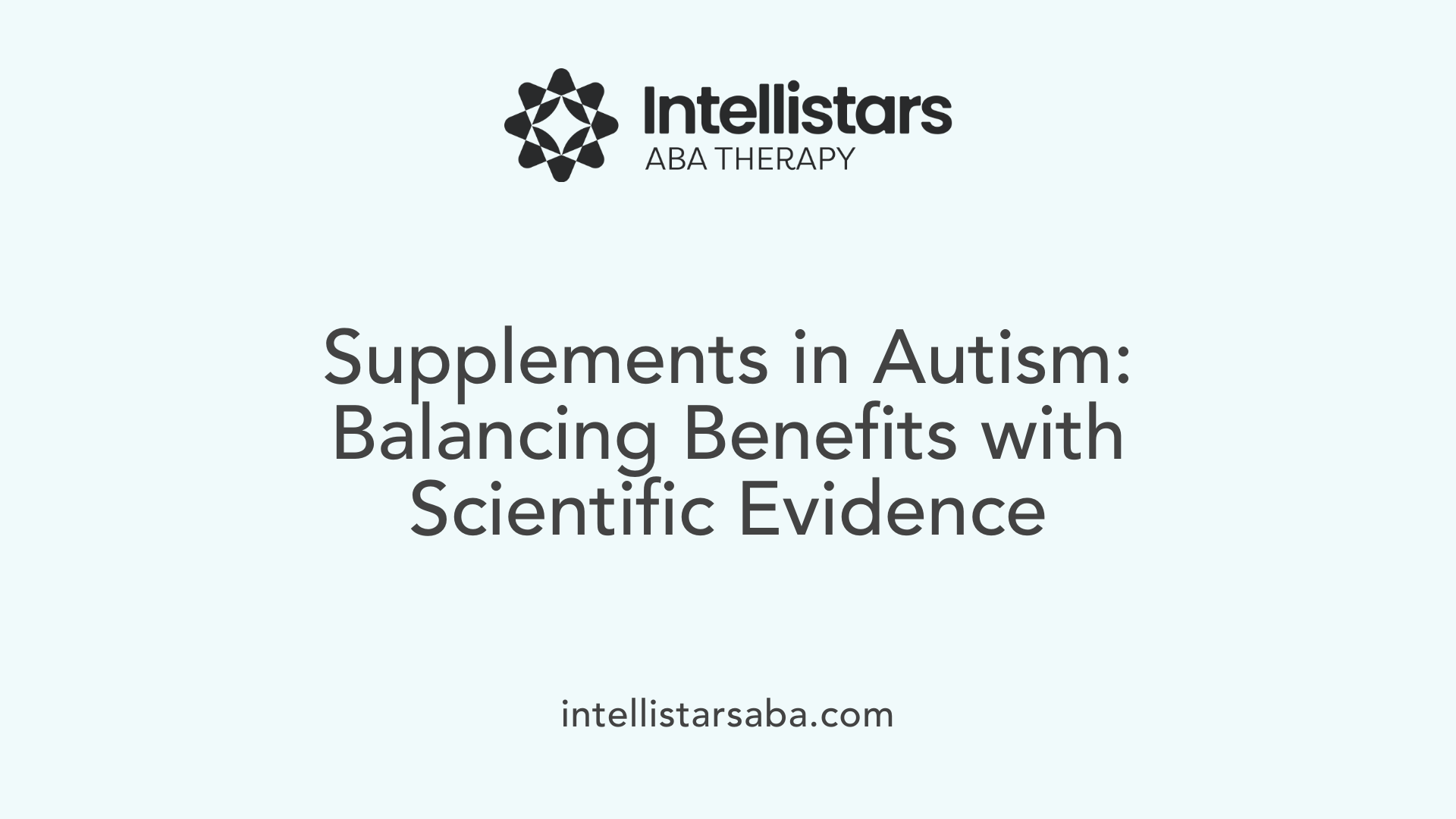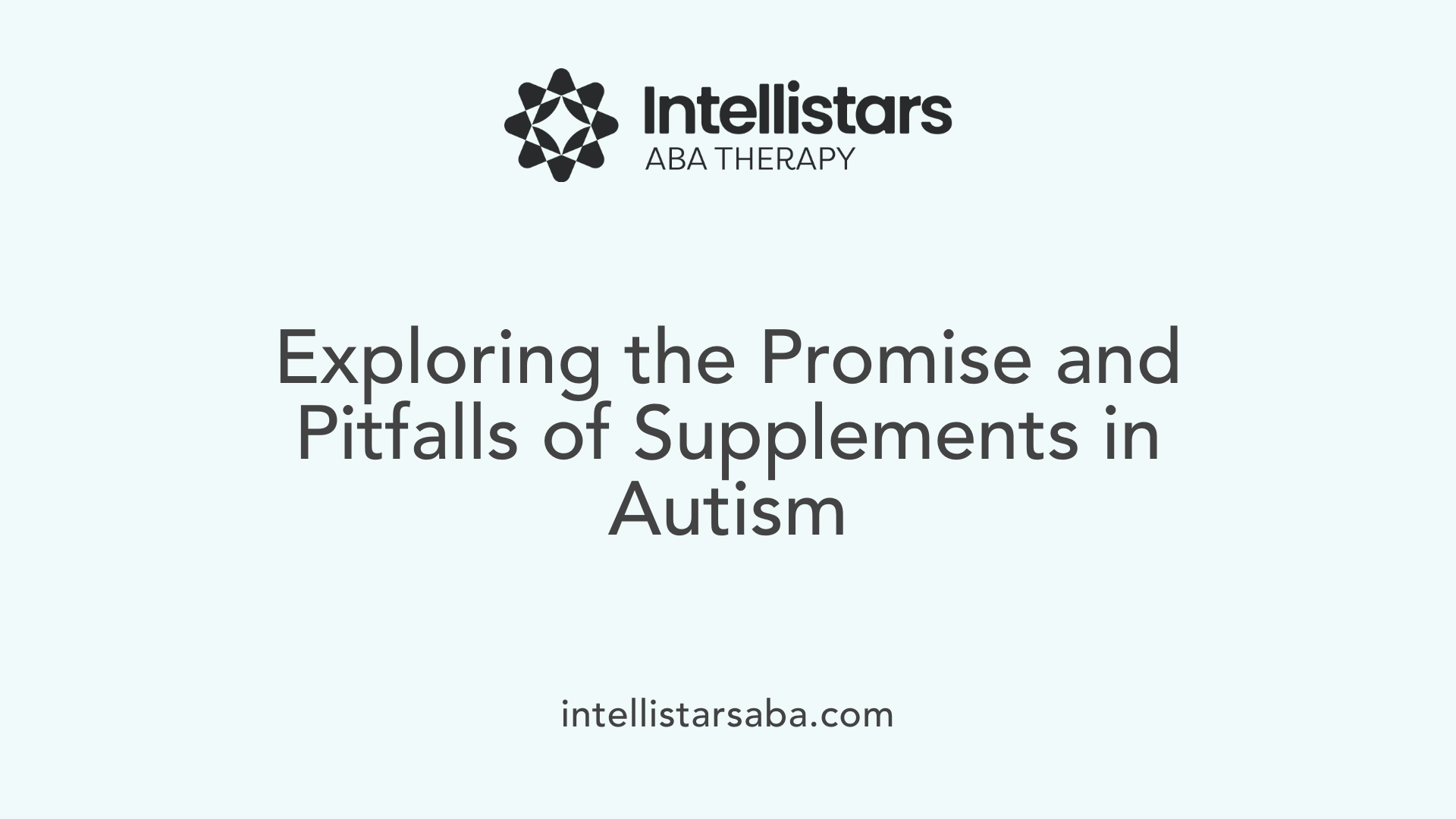Understanding Supplements and Vitamins in Autism
Nutrition plays a significant role in managing autism spectrum disorder (ASD), with many parents turning to supplements and vitamins as part of their child's comprehensive care plan. While scientific research varies in its findings, these nutritional interventions are often used to address specific deficiencies, improve gastrointestinal health, support brain function, and potentially alleviate some ASD symptoms. This article provides a thorough overview of the current scientific evidence, safety considerations, and guidance for selecting effective supplements, emphasizing an educational and research-oriented perspective.
Nutritional Supplements Commonly Used in Autism

What is the purpose of discussing vitamins and supplements in autism?
The information regarding vitamins and supplements for autism is primarily meant for educational and research purposes. It aims to provide a comprehensive overview of scientific findings, clinical studies, and survey data related to supplement use. The focus is on understanding potential benefits, limitations, and biological mechanisms without endorsing any specific products. Healthcare professionals and caregivers are advised to consider professional guidance before using any supplement.
How do specific nutrients influence autism symptoms?
Certain nutrients play roles in supporting brain development, neurochemical balance, and gut health in individuals with autism. For example, omega-3 fatty acids are vital for cognitive functioning, and vitamins like B6, B12, and folate contribute to neurotransmitter synthesis and nerve health. Minerals such as magnesium, zinc, and calcium help regulate neuronal excitability and muscle function.
Dietary improvements focusing on nutrient-rich foods and targeted supplementation may help alleviate behavioral and gastrointestinal symptoms. For instance, omega-3s have been linked to improvements in hyperactivity and sleep quality, while folinic acid has shown promise in enhancing language and attention. However, it’s important to note that current evidence remains mixed, with some studies indicating benefits and others showing inconclusive results.
Are certain vitamins and supplements safe and effective?
Research demonstrates that some supplements, like folinic acid and methylcobalamin (a form of vitamin B12), are generally safe when used appropriately and have shown preliminary efficacy in improving ASD symptoms in clinical trials. Folinic acid, in particular, has been associated with positive behavioral changes, especially in children with specific genetic mutations affecting folate metabolism.
Vitamin B12, especially in high doses, has been linked to enhancements in language skills and social behaviors. Supplements like melatonin are widely used to address sleep disturbances with good safety profiles.
Nevertheless, not all supplements have consistent evidence supporting their efficacy, and safety can depend on dosage, individual health status, and quality of the product. Therefore, healthcare consultation is essential before starting any supplement regimen.
Guidance for selecting safe and effective supplements
Choosing appropriate supplements involves considering scientific evidence, manufacturing standards, and individual health needs. Reputable brands with third-party testing, such as those meeting GMP or NSF standards, can assure quality and safety.
Caregivers should consult healthcare providers to tailor supplementation plans, particularly for children with medical complexities or nutritional deficiencies. Using supplements as adjuncts to a balanced diet and behavioral therapies is recommended.
Monitoring for adverse effects and adjusting doses as necessary help ensure safety. It is also beneficial to stay updated through trusted sources like the Autism Research Institute and peer-reviewed research.
How effective are supplements according to scientific research?
The evidence suggests that some vitamins and nutraceuticals can produce modest improvements in symptoms such as sleep, hyperactivity, communication, and socialization. For example, studies on folinic acid and vitamin B12 show promising results, with some children experiencing significant behavioral enhancements.
Survey data indicates that many caregivers perceive these supplements as beneficial, with reported improvements in behavior and minimal adverse effects. Despite these positive findings, large-scale and long-term studies are needed to definitively establish efficacy.
What scientific research underpins supplement use?
Research includes randomized controlled trials examining outcomes like language development, social engagement, and behavioral issues. Notably, trials with folinic acid have demonstrated improvements in language and attention, particularly in children with specific autoantibodies. Surverys reinforce perceived benefits from supplement use.
While promising, studies often have limitations regarding sample size and duration. As such, ongoing research aims to better understand mechanisms, optimal dosing, and long-term safety.
What does current clinical data suggest about supplements in ASD?
Clinical data supports the notion that certain supplements can serve as supportive interventions. Evidence shows improvements in sleep with melatonin, in communication with folinic acid, and in behavior with omega-3 fatty acids and probiotics.
Most studies report minimal adverse effects, making supplements a potentially safe addition to conventional therapies. However, individual responses vary, and usage should be personalized. Overall, supplements are regarded as adjuncts, not replacements for evidence-based behavioral and medical interventions.
| Nutrient/Supplement | Supported Benefits | Evidence Type | Safety Notes |
|---|---|---|---|
| Vitamin C | Possible reduction in stereotypic behaviors | Small studies | Generally safe at recommended doses |
| Vitamin B6/Magnesium | May ease behavior and sleep issues | Mixed results | Excess doses can cause adverse effects |
| Folinic acid | Improved language, attention | RCTs | Well-tolerated, especially with autoantibodies |
| Vitamin B12 | Cognitive and language improvements | Clinical trials | Safe under medical supervision |
| Omega-3 fatty acids | Hyperactivity, cognition | Multiple small studies | Safe in recommended doses |
| Probiotics | Gut health, behavior | Preliminary studies | Use strains with proven safety |
| Melatonin | Sleep regulation | Widely used | Short-term safety established |
This overview emphasizes that while some nutrients show promise, medical oversight and personalized assessment are crucial in supplement use for individuals with autism.
Potential Benefits and Limitations of Supplement Use in Autism

How effective are vitamins and supplements in improving autism symptoms according to scientific evidence?
Scientific research on the use of vitamins and supplements in treating autism spectrum disorder (ASD) shows a spectrum of results. Certain nutraceuticals, such as folinic acid and vitamin B12, have demonstrated promising benefits, particularly in areas like language, cognition, and attention. For instance, large doses of folinic acid (1–2 mg/kg/day) in controlled studies have improved language skills and focus in children with ASD. High-dose methylcobalamin B12 has also shown improvements in language and social responsiveness.
Survey data and clinical trials suggest that several supplements—including melatonin for sleep regulation, omega-3 fatty acids for brain health, probiotics for gut improvement, and antioxidants like curcumin—may offer modest benefits. Many parents and caregivers report noticeable improvements in behavior, sleep, and social interaction within a few months of supplementation, with minimal adverse effects.
However, despite these positive signals, the scientific evidence remains mixed. While some studies show benefits, others have failed to find conclusive results or have been limited by small sample sizes. The overall effect size of these interventions tends to be medium, meaning they can help but are unlikely to produce dramatic changes alone.
More comprehensive, long-term research is necessary to establish clear guidelines and determine the extent to which these supplements can influence core autism symptoms. Therefore, supplements should be seen as supportive tools rather than standalone cures or treatments.
Perceived improvements and anecdotal reports
Many parents of children with ASD report noticeable improvements after using nutritional supplements. These include better sleep, reduced stereotypic behaviors, improved eye contact, communication skills, and overall mood. Supplements like vitamin C are believed to support neurotransmitter production and immune function, while omega-3s are associated with enhanced mood and attention.
Probiotics such as Bacteroides fragilis are used to normalize gut flora, which is often disrupted in ASD, leading to improvements in gastrointestinal issues that can influence behavior. Melatonin helps regulate sleep cycles, making daytime activities more manageable. Some parents also observe positive behavioral changes with antioxidants like quercetin and curcumin, which may reduce repetitive behaviors.
These reports are anecdotal but influential in guiding some caregivers toward supplement use. However, individual responses vary widely, and placebo effects cannot be ruled out without rigorous scientific validation.
Clinical trial findings and scientific evidence
Controlled studies have explored various supplements' roles in ASD management. Double-blind, placebo-controlled trials have identified specific benefits with certain nutrients. For example, high doses of folinic acid have improved language and attention skills, while vitamin B12 supplementation has shown cognitive and speech improvements.
The Autism Nutrition Research Center developed a specialized supplement called ANRC Essentials Plus, which has been evaluated in randomized controlled trials. Results indicated significant improvements in nutritional status and some behavioral measures with minimal side effects, supporting a role for targeted nutritional interventions.
Similarly, research on omega-3 fatty acids suggests potential cognitive and behavioral benefits, although larger studies are needed to confirm these effects. Melatonin is well-supported for its safety and efficacy in sleep improvement, a common challenge for children with ASD.
Despite these promising findings, heterogeneity among study designs, small sample sizes, and variability in supplement dosages limit the generalizability of the outcomes. As a result, while scientific evidence supports the cautious use of certain supplements, they should complement, not replace, evidence-based therapies.
Limitations of current research and need for further studies
Current research faces several challenges. Many studies have small sample sizes and short durations, limiting their ability to assess long-term safety and effectiveness. Heterogeneity in supplement formulations, dosages, and participant characteristics complicates comparisons.
Furthermore, individual differences such as genetic factors, like MTHFR mutations affecting folate metabolism, influence supplement responses and require personalized approaches. The placebo effect is also significant, emphasizing the importance of rigorous trial designs.
There is a pressing need for large-scale, long-term randomized controlled trials that evaluate the combined use of multiple supplements and their interactions with standard behavioral and educational therapies. Better understanding of biological mechanisms and genetic influences will enhance targeted interventions.
The role of caregiver and parent observations
Parents and caregivers are often the first to notice behavioral changes following supplement use. They report improvements in sleep, attention span, social responsiveness, and reductions in problematic behaviors. These observations, while subjective, are vital in guiding treatment decisions.
Surveys involving hundreds of caregivers indicate perceived benefits, with a substantial proportion rating overall improvements as moderate to great. Many also note that minor adverse effects, such as gastrointestinal upset or irritability, tend to decrease when doses are adjusted.
Caregivers emphasize the importance of professional consultation when starting supplements, to ensure safety and appropriate dosing. Their feedback underscores the need for more robust scientific research to validate and better understand these anecdotal reports.
| Aspect | Evidence | Limitations | Comments |
|---|---|---|---|
| Scientific evidence | Promising results with folinic acid, B12, melatonin, omega-3 | Heterogeneity in studies, small sizes | More research needed for confirmation |
| Anecdotal reports | Improved sleep, behavior, social skills | Subjective, placebo effect possible | Valuable but not definitive |
| Research studies | Controlled trials show benefits with specific doses | Variability in design & population | Ongoing studies expected to clarify roles |
| Caregiver observations | Noted improvements, high perceived benefit | Bias and placebo influence | Useful for initial guidance |
Overall, supplements show potential as a supportive strategy for managing some ASD symptoms. Still, they are most effective when integrated into a comprehensive treatment plan supervised by healthcare professionals.
Specialized Supplements and Emerging Research Trends

What scientific research exists regarding vitamins and supplements for autism spectrum disorder?
Scientific studies on supplements and vitamins for ASD include a mix of clinical trials and survey-based research that evaluate their safety and effectiveness. Randomized controlled trials (RCTs) have shown promising results for certain compounds. For example, folinic acid has been observed to improve language and attention in children with ASD, particularly those with high autoantibody titers, with minimal side effects. Vitamin B12, especially methylcobalamin, has also demonstrated advantages in language, cognition, and social behaviors.
Supplements like melatonin are widely used to address sleep disturbances, showing notable benefits in sleep quality, which can indirectly improve daytime behavior. Other compounds such as N-acetyl cysteine (NAC), sulforaphane, and vitamin/mineral complexes like ANRC-Essentials Plus have been investigated for their potential benefits.
Survey data supports that caregivers perceive benefits from these nutraceuticals, including improvements in behavior and overall functioning, with minimal adverse effects. However, the quality, consistency, and scope of evidence vary, and more extensive research is needed to establish definitive efficacy and safety standards for these interventions.
Are certain vitamins and supplements safe and effective for supporting individuals with autism?
Many vitamins and supplements, such as folinic acid and vitamin B12, are generally regarded as safe and have demonstrated potential benefits in managing ASD symptoms through well-designed clinical trials. For example, folinic acid has shown to lessen symptom severity and improve behavioral outcomes, especially when autoantibodies are involved.
Supplements like ANRC-Essentials Plus, developed based on over a decade of research, have been linked to improvements in nutritional status and broader behavioral benefits. These products tend to have favorable safety profiles, with most adverse effects being mild or infrequent.
However, individual responses can vary, and the long-term safety profile of many supplements is still being studied. It remains essential to consult healthcare providers before starting any supplement regimen, to ensure safety and tailor treatment to each child's needs.
What guidance is available for choosing safe and effective supplements for autism?
Selecting appropriate supplements involves careful consideration of scientific evidence, ingredient quality, and regulatory standards. It is prudent to consult healthcare professionals, such as pediatricians or dietitians who are knowledgeable about ASD, to identify which supplements are suitable and safe based on individual health profiles.
Looking for products certified by reputable organizations like GMP, USP, or NSF helps ensure quality and potency. Transparency in labeling and clear ingredient lists are critical to avoid contaminants or ingredients that may trigger sensitivities.
Probiotics and other microbiome-targeted strategies should be chosen from reliable sources, as the viability of these products can diminish over time. The goal is to incorporate supplements as part of a holistic approach, emphasizing a nutrient-rich diet and addressing specific behavioral or physiological symptoms. Such personalized strategies are best developed with professional guidance, combining scientific research with clinical judgment.
Emerging trends in supplement research for ASD
Recent research trends focus on novel compounds and approaches, such as targeting inflammation, oxidative stress, and microbiota imbalances. Investigators are exploring amino acids, antioxidants like curcumin and quercetin, and natural compounds like sulforaphane for their neuroprotective and anti-inflammatory properties.
Emerging evidence also suggests that individual genetic differences, such as MTHFR mutations affecting folate metabolism, can influence response to supplementation. Personalized nutrition strategies accounting for genetic profiles are increasingly emphasized.
Gut health is a major area of interest, with probiotics, prebiotics, and digestive enzymes being studied for their role in modulating gut-brain interactions and reducing gastrointestinal symptoms.
The development of specialized formulations, such as research-backed vitamin/mineral blends tailored for ASD, signals a move toward more targeted, effective interventions. These formulations aim to optimize brain health, reduce inflammation, and support overall nutritional status, leveraging insights from ongoing molecular and clinical research.
| Research Focus | Supplements Under Investigation | Notable Findings | Future Directions |
|---|---|---|---|
| Neuroinflammation | Curcumin, quercetin, sulforaphane | Reduce aggression, improve social responses | Larger clinical trials, personalized approaches |
| Microbiome Modulation | Probiotics, prebiotics | Normalize gut bacteria, improve GI symptoms | Long-term safety, strain-specific effects |
| Genetic Factors | Methylated B vitamins, folinic acid | Improved language and attention in some cases | Genotype-based supplement strategies |
| Oxidative Stress | Antioxidants like N-acetyl cysteine | Reduce sensory and behavioral symptoms | Dose optimization and safety studies |
Continuing advancements aim to optimize the safety, targeting, and individualization of supplement strategies for ASD, aligning with the broader goals of personalized medicine.
Summary and Future Directions in Nutritional Autism Support

What does current clinical data say about the use of supplements and vitamins in autism treatment?
Research on nutritional supplements for children and adults with autism spectrum disorder (ASD) shows a growing interest in their potential benefits. Clinical evidence indicates that targeted nutrients such as folinic acid, vitamin B12, melatonin, and broad-spectrum vitamin and mineral formulations may help manage certain ASD symptoms.
For instance, high doses of folinic acid (1–2 mg/kg/day) have demonstrated improvements in language and attention in children with ASD in double-blind, placebo-controlled studies. Similarly, methylcobalamin (a form of vitamin B12) has shown positive effects on language, cognition, and social engagement. Melatonin supplements are widely used to address sleep disturbances, with many children experiencing better sleep quality.
Large surveys and clinical trials suggest that nutraceuticals are generally associated with slight to moderate improvements in behaviors such as hyperactivity, repetitive behaviors, and social responsiveness. They are also linked to minimal adverse effects, making them a potentially safe adjunct to traditional therapies.
Moreover, comprehensive supplement formulations like ANRC Essentials Plus, developed based on extensive research, indicate that nutraceuticals can significantly improve nutritional status, which is often compromised in children with ASD due to limited diets.
However, the current evidence comes with limitations. Many studies involve small sample sizes or rely on subjective parent reports. Long-term effects and optimal dosing strategies remain largely unknown.
Overall, the scientific consensus suggests that certain supplements may offer benefits when used appropriately. Nevertheless, their use should be supervised by healthcare professionals to ensure safety, especially considering individual variability in response and potential interactions with other treatments.
Why is personalized approach important?
Autism is highly heterogeneous, with different children exhibiting diverse symptoms, comorbidities, and nutritional deficiencies. For example, some children have impaired folate metabolism due to MTHFR mutations, making methylated B vitamins more effective. Others may suffer from vitamin D deficiency or gut microbiota imbalances requiring probiotics.
Personalized nutrition plans that consider genetic profiles, specific deficiencies, behavioral symptoms, and dietary habits can optimize outcomes. For instance, testing for vitamin and mineral levels before supplementation helps avoid excessive intake and adverse effects. This tailored approach increases the likelihood of meaningful benefits and reduces unnecessary supplement use.
What are emerging research areas and potential new interventions?
Research efforts are expanding into exploring the gut-brain axis, with probiotics like Bacteroides fragilis showing promise in normalizing gut flora and potentially reducing ASD-related gastrointestinal and behavioral symptoms.
Nitric oxide modulators, anti-inflammatory agents such as sulforaphane from broccoli sprouts, and antioxidants like curcumin and quercetin are under investigation for their neuroprotective and anti-inflammatory properties.
Emerging studies also focus on mitochondrial support, involving supplements like Coenzyme Q10 and omega-3 fatty acids, given their roles in cell energy production and brain health.
While preliminary results are encouraging, larger and longer-term clinical trials are necessary to validate these interventions' safety and efficacy.
Why is there a call for rigorous, long-term clinical trials?
Despite promising findings, the evidence base for many supplements remains limited by small sample sizes, short durations, and variability in methodologies. There is a critical need for well-designed, multisite, long-term randomized controlled trials to establish more definitive guidance.
Longitudinal studies can help assess sustained benefits, optimal dosing, and safety profiles over time, especially as some supplements may accumulate or cause adverse effects with prolonged use.
Funding and ethical considerations must also be addressed to support comprehensive research that can inform clinical guidelines.
How do multidisciplinary care teams influence supplement decisions?
Decisions about using nutritional supplements for ASD are increasingly made within a multidisciplinary framework involving pediatricians, neurologists, dietitians, psychologists, and integrative medicine practitioners.
These teams evaluate nutritional status, behavioral needs, genetic factors, and potential interactions with medications. They develop personalized plans that incorporate dietary modifications, supplements, and behavioral interventions.
This collaborative approach ensures treatments are safe, targeted, and aligned with each child's unique profile, enhancing overall outcomes.
| Aspect | Current Evidence | Future Perspectives | Challenges |
|---|---|---|---|
| Supplements with proven benefits | Folinic acid, B12, melatonin | Expanded use based on ongoing trials | Ensuring safety and appropriate dosing |
| Gut health interventions | Probiotics, prebiotics | New strains and formulations | Variability in individual responses |
| Emerging therapies | Sulforaphane, antioxidants | Larger studies needed | Standardization and long-term safety |
| Personalized treatment | Genetic testing, biochemical screening | More precise interventions | Accessibility and cost |
| Research quality | Small trials, subjective reports | Large-scale, rigorous trials | Funding and ethical hurdles |
In conclusion, while current data support the cautious use of certain nutritional supplements as part of an integrated ASD management plan, significant gaps remain. Advances in personalized medicine, ongoing research into novel interventions, and multidisciplinary collaboration will shape future strategies, ultimately aiming for safer, more effective support tailored to individual needs.
Looking Ahead: Optimizing Nutritional Support in Autism
In summary, the landscape of vitamins and supplements for autism is evolving, with promising research supporting their potential to improve various symptoms. However, the scientific community recognizes the need for more rigorous, long-term studies to confirm efficacy and safety. The integration of nutritional interventions should be personalized, taking into account individual genetic differences, dietary patterns, and gut health. Healthcare professionals and multidisciplinary teams play a crucial role in guiding safe, evidence-based supplement use, ensuring benefits outweigh risks. As research advances, new compounds and strategies are likely to emerge, offering hope for more targeted and effective nutritional therapies. Careful, informed application of supplements—paired with ongoing scientific inquiry—will be key to maximizing potential benefits for individuals on the autism spectrum.
References
- Vitamins and Supplements
- Best Autism Supplements and Vitamins
- ANRC Multivitamin | Shop Multivitamins for Autism
- Ratings of the Effectiveness of Nutraceuticals for Autism ...
- 5 Helpful Supplements for Autism Spectrum Disorder
- Mom's Guide to the Best Supplements & Vitamins for Autism
- Autism Supplements - Vitamins for Kids
- Vitamin/mineral/micronutrient supplement for autism spectrum ...
- Ratings of the Effectiveness of Nutraceuticals for Autism ...
- Vitamin/mineral/micronutrient supplement for autism spectrum ...






